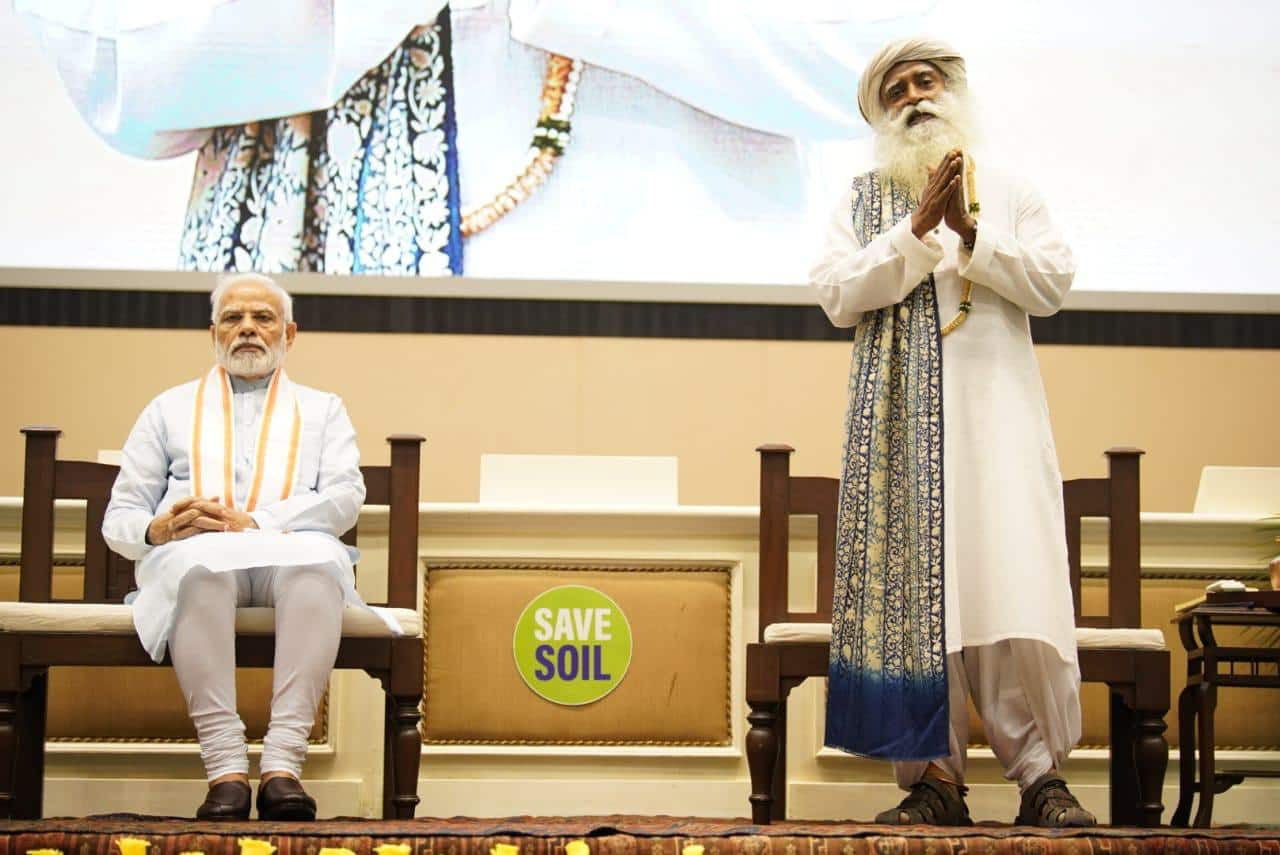6 June 2022Sadhguru arrived in Delhi on the 75th day of his ‘Save Mitti Yatra’ and witnessed another set of exciting events that day, including an event on ‘Save Soil’ with Indian Prime Minister Narendra Modi followed by a public address at the packed IG Complex in New Delhi was. The Prime Minister in his address lauded the Save the soil movement and later on, a booklet was presented by Sadhguru to save soil.
It is an honor and privilege to hand over the soil policy booklet to Hon’ble Prime Minister Shri. @narendramodi Those whose concern for the soil is deep in their hearts. Under his able leadership, India should lead the way in effecting global change in soil health. #save soil, -sg pic.twitter.com/WLwiP8WgyQ
— Sadhguru (@SadhguruJV) 5 June 2022
“It is an honor and privilege to hand over the soil policy booklet to Hon’ble Prime Minister Shri. @narendramodi whose concern for soil is deep in his heart. Under his able leadership, may India lead the way in effecting global change in soil health. # Save the soil.”

Addressing a gathering of around 15,000 people at IG Complex, New Delhi, Sadhguru called upon people to voice their concerns to save the soil. The Principal Economic Adviser, Government of India, Mr. Sanjeev Sanyal acknowledged the need for a major worldwide effort to ensure that the planet remains habitable for generations to come.
At the beginning of his address, Sadhguru highlighted the grave danger of soil dying and reminded the audience that we can become a generation that brought humanity back from the brink of disaster. Governments in democratic nations are elected for a limited period of time and it is the mandate of the people that drives the government to act on something that results in a longer term.
Sadhguru said, “People’s mandate is not just by vote but by voice” and urged people to “keep up our voice till we solve the soil issue in this country and the rest of the world”. “
Stressing on all other environmental issues as long as the soil is alive, Sadhguru stressed the need to treat soil extinction as a separate issue. Once soil extinction begins to appear, none of these things will matter because the degraded soil crisis is “of survival importance”, which has “existential consequences on our lives”.
The program began with a live performance by artisans from different states as soon as Sadhguru entered the venue, followed by an enthralling performance by singer Mohit Chauhan, classical dancer Radhe Jaggi and Isha Sanskriti.
Earlier at the save soil program at Vigyan Bhawan, PM Narendra Modi joined Sadhguru and expressed his full support and encouragement for the movement. Describing this movement as a great service to humanity, the Prime Minister strongly appreciated Sadhguru’s motorcycle journey.
Expressing the belief that the trip would lead to a world affection for clay, he also quipped that he too must have seen the power of Indian soil. After the program, Sadhguru presented the Soil Save Policy booklet to the Prime Minister. The handbook provides practical, scientific solutions that governments can take to regenerate soils in their countries.
The day marks the 75th day of Sadhguru’s 100-day solo motorcycle Journey for Soil across 27 countries. So far this movement has touched 2.5 billion people, while 74 countries have agreed to work to save their nation’s soil. More than 15 lakh children in India have written to the Prime Minister requesting him to take action to save the soil of the country and their collective future.
The primary objective of Save Soil Andolan is to urge all the countries of the world to mandate minimum 3-6% organic content in agricultural soil through immediate policy reforms. Without this minimal organic material, soil scientists have warned of imminent soil death, a phenomenon they are calling ‘soil extinction’.
In India, about 30% of the fertile soils in the country have already become barren and unable to yield. The United Nations has warned that at current rates of soil erosion, 90% of the Earth could turn into a desert by 2050—less than three decades from now. To prevent this catastrophe, Sadhguru launched the Save Soil Movement in March this year, traveling to 27 countries and meeting leaders, politicians, scientists and citizens to mobilize support for saving soil.
The Save the Soil movement is supported by the United Nations Convention to Combat Desertification (UNCCD), the United Nations Environment Program (UNEP), the United Nations World Food Program and the International Union for the Conservation of Nature (IUCN).

